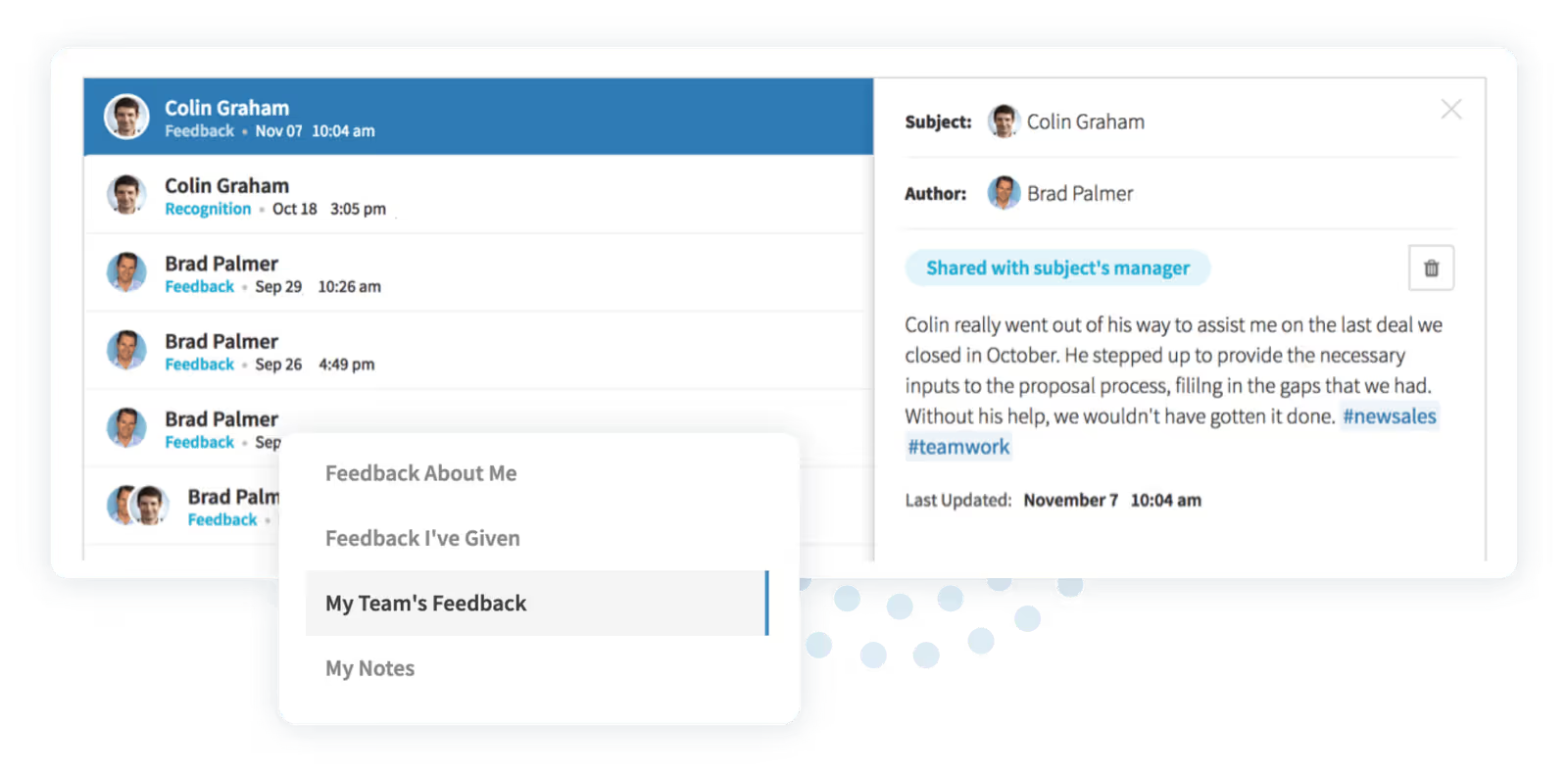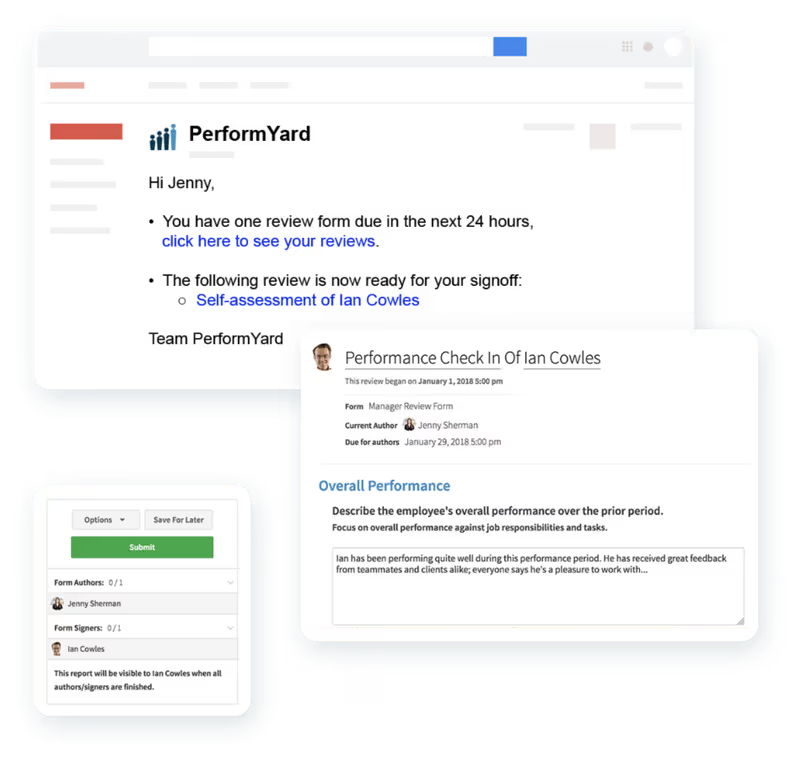19 Features of Automated Performance Management Systems in 2026
Purchasing an automated performance management system is a big commitment for your organization. We think the best options include features in three categories: flexibility, ease of use, and great support. Software that excels in these three areas may be a great fit for your managers and employees.
Flexibility
Good performance management software accommodates a wide range of performance management strategies like annual reviews, quarterly goals, or continuous feedback. The best software adapts when your company’s needs change.
1. Performance Tools
All performance management systems should blend goals, feedback, and check-ins in their process. Goals set direction, feedback ties goals to the day-to-day, and check-ins provide space for long-term performance discussions.
Krista Molloy, Director of HR at Egg Strategy, emphasized the efficiency benefits of PerformYard:
“PerformYard’s biggest advantage is the time it saves our team, in addition to keeping all performance information in one place. This software is definitely a game changer.”
2. Review Cycles and Timing
There should be exhaustive options for review cycle design and timing. You should be able to decide who conducts reviews, when reviews take place, and in what sequence reviews occur.
3. Form Question Types
The software needs to accommodate questions you want to ask your employees, not just commonly asked questions.
4. Goal Options
Effective software allows you to choose the type of goals you want to set like KPI’s, S.M.A.R.T. goals, long-term goals, or any other type of goals.
5. Feedback Flexibility
Good software makes it easy to provide downward, upward, peer, or external feedback and edit visibility settings so reviewers choose who sees their feedback and when.
According to the PerformYard State of Performance Management Report, in companies with 250+ employees, employee satisfaction scores are highest when 20–40 people provide qualitative feedback comments. This finding suggests that automated systems like PerformYard help organizations achieve the optimal volume of feedback for better employee satisfaction at scale.

6. Self-Serve Administration
HR should be able to track the progress of reviews and goals at a glance and customize the software on their own.
Ease of Use
Valuable performance management software is easy for everyone to use, including employees and managers. The key to high participation rates is enabling employees to focus on feedback, not bells and whistles.
7. Clean Design
The best automated performance management systems will have clean dashboards that give employees everything they need to see the moment they log in.
8. Robust Notification System
Great performance management software has a flexible notification/reminder system so employees don’t have to keep the software open.

9. Single Sign On
The software you choose should integrate with an existing system like your HRIS, your SSO provider, or be compatible with your own SSO solution. For example, PerformYard integrates with HRIS systems like BambooHR so you can easily transfer employee data.
10. Simple Flow
Managers should be able to launch check-ins from their inbox and forward them to the right people with a single click.
11. Smart Automation
The right system automates mundane tasks like distributing forms, collecting sign-offs, tracking cycle progress, collating data, and more.
Dedicated Success Manager
The best performance management companies assign a dedicated success manager to your organization. Everyone from the CEO to the newest hire is involved in the performance management, so the stakes are too high to rely on help pages or support tickets that may go unanswered. The best support teams will:
12. Ongoing Support
Even with the smoothest launch possible, questions will arise. As mentioned, many vendors charge support as a separate service, which can dramatically increase your ongoing expenses throughout the year.
Look for a solution that offers regular, ongoing support at no additional cost to avoid sticker shock after kickoff.
Key Questions:
- Are there any limits to the support you receive after implementation?
- What form does ongoing support take?
- Do you have someone's phone number? Email address?
13. Create Custom Implementations
Great performance management strategies are designed for their organization. You want someone who will listen first, then support your efforts.
14. Train Your Employees
Live employee training by experts ensure every employee at the organization has what they need to be successful.
15. Develop a Long-term Relationship
A good success manager will partner with you as long as you use the software so you don’t have to re-explain your situation every time you have a question.
16. Reach out Proactively
Strong support teams go above and beyond answering questions by regularly contacting you to support your ongoing process.
17. Be Knowledgeable on Automated Performance Management Systems
A knowledgeable support team will understand the software, performance management processes, and can advise you on best practices.
When your performance management vendor is outsourced or offshoring the support teams it can be a sign that the organization is interested in cutting costs more than ensuring your success.
18. Cost of Implementation
For most organizations, getting started with a dedicated performance management system will be completely new territory. You may have several members of your management or even leadership teams who are software-fatigued and wary of learning another system. That's why implementation is so important.
Your performance management system should come with the kind of support that makes a great first impression with users. But many performance management vendors only provide limited support, or charge support as a separate service.
Unless your entire office is extremely tech-savvy, you should probably select a solution that offers full training (preferably at no additional cost) at kickoff so that every employee feels great about using your new tool from day one.
Key Questions:
- Who will be responsible for setting up the platform initially? You or your provider?
- Are there any extra costs?
- Is there human support during this process?
- Will there be training for the staff?
- If yes, is the training in-person or remote?
19. Data Security Standards
We cannot overstate the importance of data security when it comes to selecting a performance management system. More data than ever before is falling into the laps of employers and HR departments, and you need to make sure your business is protected by using a system that's completely compliant.
Look for a solution that offers real-time encrypted backups (preferably using HTTPS protocol) to reduce any exposure to data loss. A performance management system that goes above and beyond will also have features that protect against liability, such as review reminders and alerts for missing signatures.
But beyond the legal and regulatory risks, performance data that is collected and stored properly can be a huge asset to your business. Make sure your performance management system offers consistent, compliant record keeping to help guide decisions about hiring, promotions, compensation, succession planning and more.
Key Questions:
- What is the vendor’s data security policies?
- How are passwords handled and stored?
- Who owns the data, you or the vendor?
- How is the data encrypted?
- How often is the data backed-up?
- What happens if the system ever goes down?
As you consider different software solutions be sure to ask about these most important, and often overlooked, elements of great performance management software
Your Next Step
Connect with performance management vendors to discuss your performance management approach and process. It's important to understand what it will be like for HR to manage everything in the automated performance management system and what it will be like for employees to participate.
To learn more about PerformYard and schedule a product demonstration, visit PerformYard.com. In our first 30-minute call, we’ll take 5 minutes to learn about your process and then spend the rest of the time showing you what it would be like to manage your process in PerformYard.





